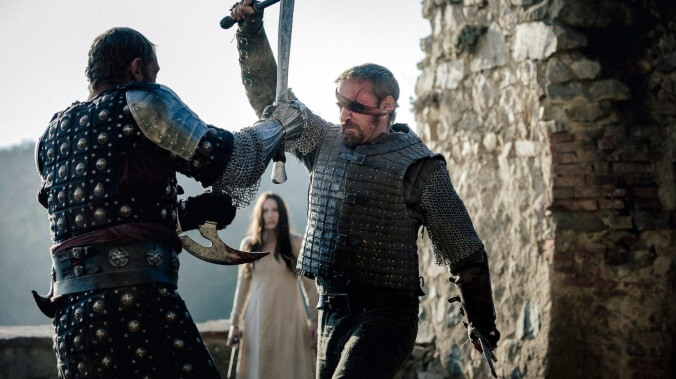In Medieval, Ben Foster turns the story of a real-life Czech military commander into a blunt instrument
Michael Caine and Matthew Goode also star in filmmaker Petr Jákl's bid for international success
Film Reviews Medieval
A title as generic as Medieval is strangely appropriate for writer-director Petr Jákl’s historical epic. It’s the most expensive Czech film ever made, with a reported price tag of approximately $23 million—and an explicit eye toward courting a worldwide box office by filming in English with an international cast that includes Ben Foster and Michael Caine. Called Jan Žižka outside the United States after the real-life military commander it portrays, this story is so rote that its main character might as well be entirely fictional, especially since Jákl fails to highlight why Žižka is a figure worth portraying.
Jan Žižka would eventually rise to prominence in the Hussite Wars of the early 15th century, infamously never losing a battle, but Medieval offers an origin story for the commander, finding Žižka (Ben Foster) in 1402 working as a knight and mercenary. While Czech King Wenceslas (Karel Roden) and Hungarian King Sigismund (Matthew Goode) compete for the throne of the Holy Roman Empire, Lord Boresh (Michael Caine) enlists Žižka to kidnap Lady Katherine (Sophie Lowe), the fiancée of Sigismund ally Lord Rosenburg (Til Schweiger), hoping that the maneuver will rein in their lust for power.
Katherine subsequently comes to terms with the brutal realities of war faced by common people—an epiphany meant to transfer her romantic interest from Rosenburg to Žižka. Sadly, Foster and Lowe fail to cultivate the kind of romantic chemistry that would sell Katherine’s emotional journey. Foster plays Žižka with a cold stoicism, even when he and Katherine are supposed to warm to one another, and Lowe lacks the depth to communicate what Katherine sees in Žižka beyond his strong sense of justice.
Conversely, Žižka’s motivations become much more personal after Rosenburg’s lieutenant Torak (Roland Møller) slaughters his family in retaliation, though this also never develops more of an emotional through line than to give Žižka a direct adversary to fight. The completion of his arc is clearly intended to fulfill his power as a freedom fighter and leader of commoners against the might of oppressive armies. But the revenge story never aligns fully with the film’s larger mythmaking, and its emotional stakes ultimately feel limp and mechanical, held together only by the obligation of familiar character and story tropes.
Those hoping for Game Of Thrones-esque intrigue will similarly be disappointed by the film’s strangely obtuse depiction of medieval European politics. It’s unclear whether Medieval hopes to appeal to hardcore history buffs, relying upon Katherine and Žižka’s stories to inject emotional beats, or it’s simply inept at communicating the relationships that drive the film. Jákl makes it fairly clear that Rosenberg and Sigismund are meant to be the scheming bad guys, but the “throne” of the Holy Roman Empire remains a fairly abstract goal, and Wenceslas’ opposition feels even less clear within the film’s plot. Consequently, the film’s central conflicts feel particularly weightless, and quite frankly, boring.
If there is one place where Medieval delivers the goods, it’s in the sparse action set pieces. Although their staging or scale offers nothing spectacular, there’s a level of gory violence rarely seen outside horror cinema, as body parts are reduced to bloody pulp. The battles also demonstrate the tactical brilliance—smokescreens and surprise defenses—that made Žižka such a renowned commander. It’s a shame that these sequences occur relatively infrequently, since their inventiveness could make the perfunctory human drama almost forgivable.
Unfortunately, however, Jákl’s film is precisely as generic as its title would suggest, and what little there is to recommend is buried under a mountain of tedium. The Czech Republic’s big swing at blockbuster filmmaking falls well short of its ambitions, taking what might have been a brutal lesson in European history and reducing it to a half-baked morass of hollow tropes and dull plotting. The irony of making Jan Žižka the main character is that there’s apparently so much more to his life that would have made for a more interesting war epic. But if the intention was to treat this origin story as a gateway to further adventures, Medieval seems unlikely to develop an audience eager for the next installment.